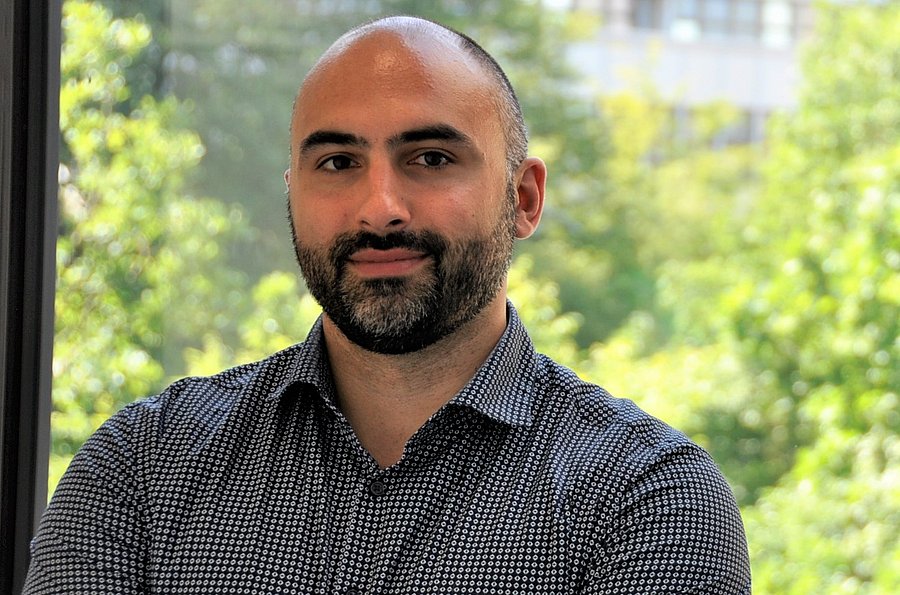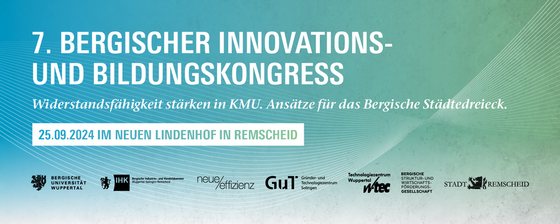
Healthy employees make companies more competitive
Sasha Javanmardi / Sports Science
Photo: UniService Transfer
Healthy employees make companies more competitive
Sasha Javanmardi from the Institute of Sports Science on health promotion measures in the workplace
On 25 September, the University of Wuppertal, the Bergische IHK and the Bergische Struktur- und Wirtschaftsförderungsgesellschaft, together with the City of Remscheid, Neue Effizienz, Solingen Business and the Wuppertal Technology Centre, are inviting you to the 7th Bergische Innovation and Education Congress (BIBK) in Remscheid.
This year's main topic is strengthening resilience in SMEs (small and medium-sized enterprises): Approaches for the Bergisch city-triangle. From 2 p.m. to 7 p.m., the organisers and their guests will be exploring the question of what sustainability and resilience mean for companies in presentations and workshops. One of the three workshops will focus on health promotion measures. Sasha Javanmardi, research associate in the Department of Exercise and Training Science at the University of Wuppertal, will give a short presentation on occupational health management.
Mr Javanmardi, you work in the Exercise and Training Science department at the Institute of Sports Science at the University of Wuppertal. You specialise in occupational health management, performance diagnostics and training counselling. What does occupational health management look like and what role does the mental resilience of employees play in it?
Javanmardi: Occupational health management is a strategic and sustainable process that includes both preventative and rehabilitative measures. It should also be scalable to enable comprehensive monitoring. This enables us to bring productivity, well-being and measurable health factors into a positive trend and adapt to current challenges.
Mental resilience plays an important role here. According to the WHO (World Health Organisation) definition, health is a state of complete mental, physical and social well-being; accordingly, the psyche is a key factor that is receiving increasing attention. Resilience can also be defined as adaptability. This brings us back full circle to occupational health management.
Very few managers are trained in this area. How do you recognise a lack of a health promotion system?
Javanmardi: First and foremost, it's the high levels of absenteeism. This would include, for example, high levels of stress as a psychological factor and musculoskeletal disorders as a physical factor. Other important factors are high employee turnover and the associated reduction in productivity, motivation and employee satisfaction.
You say that fitness for work is linked to exercise, but in many companies, there tends to be a lack of exercise. What consequences can this have?
Javanmardi: The consequences of inactivity are, for example, the musculoskeletal disorders just mentioned, reduced mobility and obesity. On a psychological level, depression can occur, for example. Cognitive performance can also be negatively affected.

7th Bergisch Innovation and Education Congress
At this year's BIBK, you will be giving a presentation on health promotion measures for managers to make the company more robust and competitive. Can you give us an example?
Javanmardi: Let's stick to the topic of exercise. In industry, for example, we analysed the physical activity of industrial employees and found that, on average, they were well above the WHO recommendations. Therefore, we cannot speak of a lack of physical activity here. Instead, there are other movement problems, such as musculoskeletal disorders due to repetitive tasks or carrying heavy loads.
In the office, on the other hand, we have noticed that many people do not adhere to the WHO recommendations and often fall short of the 8,000 - 10,000 steps per day. This means that we have to work with different exercise programmes here, as there are different problems.
A holistic approach is essential. One example of this is height-adjustable desks, which, at least, make it possible to reduce inactivity by changing behaviour. However, it is important to analyse in advance who really needs such a desk. For people with hip or knee problems, standing for long periods may not be conducive to good health, while for others it may help preventively and trigger a possible change in behaviour.
Occupational health management is about maintaining and promoting health. To do this, however, you need to know in advance how healthy the people in the company are. This cannot be decided from the outside.
However, now there are also training courses for small and medium-sized companies - for example offered by the Chamber of Industry and Commerce (IHK) Siegen - for internal employees to become so-called health scouts, as not all companies have a health officer. Can smaller companies create a healthy working atmosphere with their own employees in the face of increasing challenges?
Javanmardi: This factor can play a role, because a health scout can be a role model in the company. You have the huge advantage of being able to combine internal knowledge with health basics. You know the employees and can therefore support company health management.
Is the health scout programme also available in the Bergisches Land?
Javanmardi: I haven't found any explicit programmes for health scouts in the Bergisches Land region. There are so-called multiplier training programmes at health insurance companies that go in this direction. However, a health scout is more specialised and I would like to see something like this in the triangle of cities.

Mental health in the workplace, Pixabay
Whom can people turn to if they want more information and want to promote the health of their employees in the workplace?
Javanmardi: There are many different organisations, but you always need to know what you want and what your goal is beforehand. If you enquire at the university in my field, for example, you are more likely to get innovative impulses and ideas as well as scientific structures and measurements that take up time and resources. External service providers could be a possibility, or even health insurance companies, the Chamber of Industry and Commerce (IHK) or employers' liability insurance associations. This always depends on what goal the company is pursuing and how the company health management is set up for a holistic approach.
With the participation of the university’s Rector Prof Dr Birgitta Wolff, the Mayor of Remscheid, Burkhardt Mast-Weisz, and the Chairman of the Bergische IHK, Henner Pasch, experts from science and business will give something to think about and provide suggestions for the future. In addition, regional companies will present success stories from real life.
The event will take place at the new Lindenhof, Honsberger Straße 38, in Remscheid. Bergisch companies can register via https://www.eventbrite.de/e/bergischer-innovations-und-bildungskongress-tickets-927740646247?aff=ebdshpsearchautocomplete. The event will be moderated by Anja Backhaus from WDR.
Uwe Blass
Sasha Javanmardi is a research assistant in the Department of Movement and Training Science at the Institute of Sports Sciences at the University of Wuppertal.
